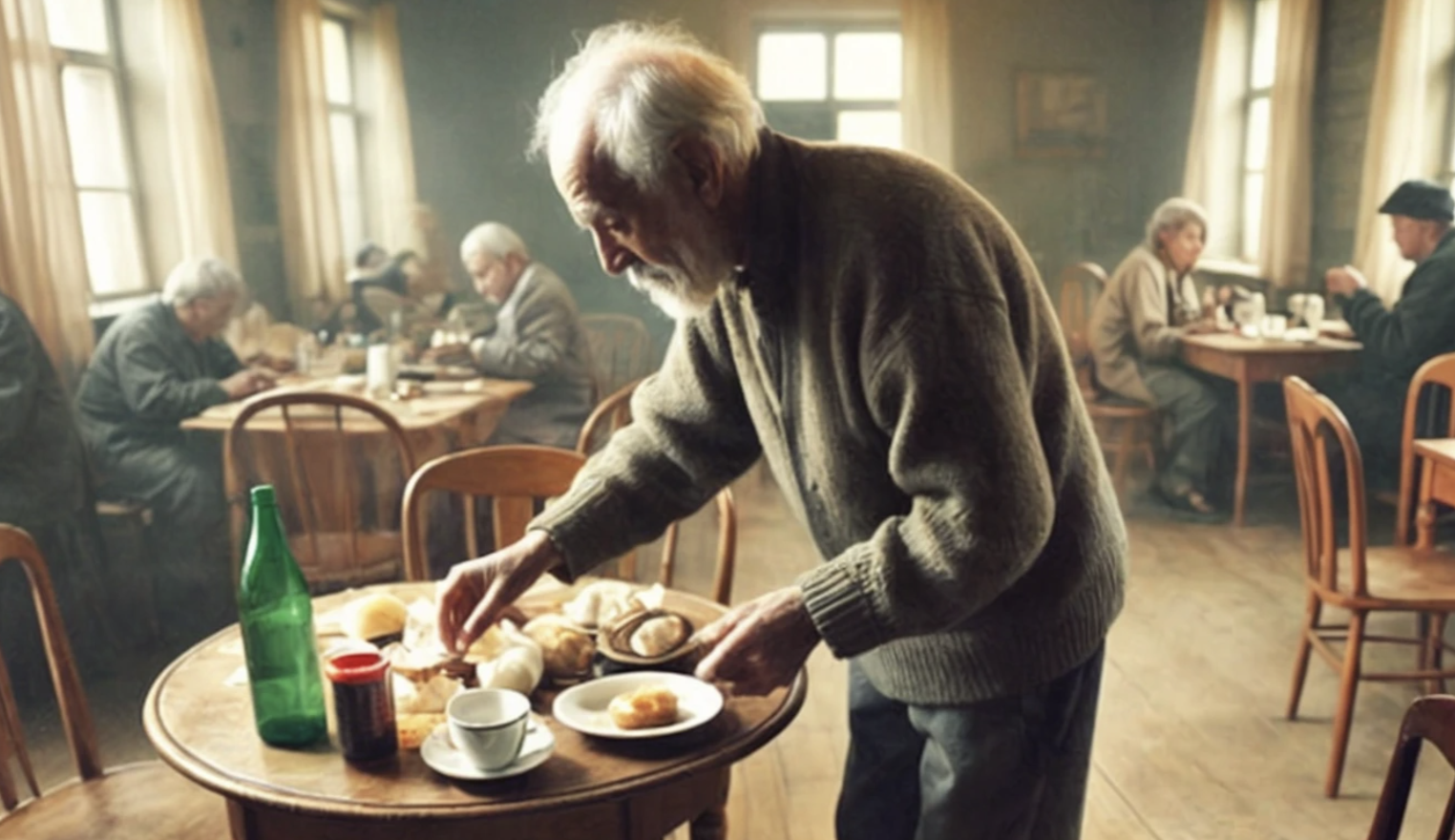Dmitry, a young chef, got a job at a small restaurant on the outskirts. The place was cozy, with windows facing a street where cars occasionally passed by. Inside, there was always the aroma of freshly baked bread and spices. The dark wood furniture added a homely comfort to the place. However, since it was on the outskirts, there were not as many visitors as desired.
For the young man, this job was not just a place to earn money. He dreamed of someday opening his own business, a small restaurant with soul. Therefore, here, in this quiet corner of the city, he hoped to learn everything—from working with the menu to interacting with guests.
The team turned out to be tiny, but in its own way, vibrant.
Sveta, the bustling waitress—a girl who could simultaneously take orders, pour tea, and answer calls. Gena, the dishwasher—a grumpy, but kind man, especially when someone helped him carry heavy boxes. And, of course, the elderly chef Mikhail Semyonovich.
Mikhail Semyonovich was a legend of this restaurant.
He had been working here longer than anyone else, was reserved and focused on his work, knew many recipes, and how to surprise almost every guest. But he had one strange feature: he always left the restaurant last.
He invariably had a small bag of food in his hands.
At first, Dmitry thought that the senior colleague was simply saving money. After all, he was a pensioner, times were tough, and food prices were rising. But soon, he began to notice oddities. Mikhail Semyonovich took home food that was usually not allowed to be taken: leftovers like soup, a piece of pie, even salads that hadn’t been served to guests.
“Maybe he’s doing it for someone?” Dmitry wondered. It made sense. Maybe he was helping someone of his own? But why then did he pack the food so cautiously, as if he didn’t want anyone to notice?
Dmitry tried to find an explanation, but questions kept multiplying. Each time Mikhail Semyonovich approached the door with that very bag, Dmitry felt a desire to ask, but he restrained himself. “It feels awkward,” he convinced himself.
One day he stayed late at the restaurant and realized it was a sign and began to wait. The wait wasn’t long.
The old man, as usual, gathered bags of food and headed for the exit. The young man threw on his jacket and followed him, not attracting attention.
Mikhail Semyonovich walked confidently, though his appearance was such that he seemed to be following a familiar route every evening. Dmitry kept his distance, sometimes approaching, sometimes falling back, so as not to reveal himself.
The streets the old man walked through became quieter. Soon they arrived at an old park. It had been a long time since anyone walked there: paths were overgrown with grass, and the lamps barely glowed. Only the rare creak of swings broke the dead silence.
Mikhail Semyonovich headed for one of the benches in the far corner of the park. Dmitry hid behind a tree, watching from a distance. After a few minutes, children began to approach the old man. First, a skinny seven-year-old boy in a torn jacket. Then two girls who held hands as if afraid of getting lost in the dark. And then a few more kids. Their faces were thin, and their clothes clearly too big for them, obviously second-hand.
The old man took out food from the bags. He distributed it to the children calmly, with a smile, as if he had done it a thousand times. At first, there was complete silence, only the rustle of bags was heard. Then the children began to thank him.
“Thank you, Uncle Misha!” suddenly sounded.
Mikhail gently patted a girl on the head, she shyly smiled and clung to a piece of bread.
When the distribution ended, the old man stood up, gathered the empty bags, and walked back. The children quickly scattered, dissolving into the darkness. Dmitry waited until Mikhail Semyonovich left and then headed home himself. He had many thoughts in his mind.
The next day, he couldn’t hold back.
“Mikhail Semyonovich, were you at the park yesterday?” he asked cautiously as soon as they were alone in the kitchen.
The old man frowned but didn’t pretend not to understand.
“Saw it, did you?” he said after a short pause.
Dmitry nodded. He felt awkward, as if he had violated something personal.
“Has it been long like this?” he asked, not knowing how to continue.
Mikhail Semyonovich sighed, looking out the window.
“Several years now,” he quietly replied. “These kids… they’re nobody’s children. Living somewhere, getting by as they can. And I… can at least do something for them.”
Dmitry didn’t know what to say. He felt both ashamed of his thoughts and warmed by witnessing such an act. There was sadness in the old man’s eyes, but also a kind of strength, as if this deed had become his life’s meaning.
“How did you start?” Dmitry asked.
Mikhail Semyonovich smiled with the corners of his lips.
“Lived nearby, saw how they starved. Thought I’d just bring food a couple of times. Then realized: if not me, then who?”
Dmitry stood, stunned. He had never met people who would do something like this just because, without any benefit.
Mikhail Semyonovich’s words didn’t leave Dmitry’s head. In the evening, lying in bed, he imagined the faces of those children. How they rejoiced at the hot food, how they looked at Mikhail Semyonovich with gratitude. This feeling didn’t let go.
The next day, during lunch, he approached the old man, who was just chopping onions.
“Mikhail Semyonovich, let’s try together,” he began, trying to speak calmly, not to sound intrusive. “I can cook portions specifically for them.”
Mikhail Semyonovich paused for a moment, then wiped his hands on a towel and looked attentively at Dmitry:
“Are you serious?”
Dmitry nodded.
“Absolutely. It’s important. You have a good deed, but it’s hard alone. Together it’ll be easier.”
The old man squinted suspiciously, as if checking the young man’s sincerity. Finally, he smiled, took a piece of onion from the board, and ate it.
“Well then, if you really care, let’s try.”
That’s how their friendship began. After the shift, when the restaurant closed, they stayed together in the kitchen. Mikhail Semyonovich taught Dmitry to cook simple, but hearty dishes: soups, pasta with stewed meat, porridges.
“The main thing is that it’s filling and easy to digest,” he said, stirring a huge pot. “These kids sometimes go two days without eating. They don’t need delicacies, but warmth.”
Dmitry listened, diligently repeated, and offered his ideas.
“What if we add some vegetables? It would be healthier.”
“Even a carrot, if you find one,” Mikhail Semyonovich chuckled. “Just don’t go overboard. This isn’t about the restaurant.”
Over time, Dmitry suggested using leftovers that were no longer suitable for customers but were still good for cooking. Mikhail Semyonovich was initially hesitant:
“Did you tell the chef?”
“I did. He approved,” Dmitry confidently replied. “He says it’s better than throwing it away.”
Every evening, they packed the food in containers and went to the park. Dmitry first saw how the children joyfully greeted Mikhail Semyonovich. They ran to him, hugged him, called him “Uncle Misha.” Dmitry became a new person to them, initially met with caution.
“And who are you?” asked a ten-year-old boy.
“A friend,” Dmitry smiled, passing him a container. “And now I’ll come more often.”
The children laughed, ate right there, not waiting for the food to cool. Mikhail Semyonovich sat next to them, patting someone on the head and telling funny stories. Dmitry realized that these evenings meant more to him than work. Every time, seeing how the guys enjoyed the food, he felt he was doing something truly important.
Soon, passersby began to approach them. Some nodded silently, others brought their own products. One man once handed over a bag of warm clothes:
“This is for you. The kids need it more than me.”
Dmitry watched as the children tried on mittens, and Mikhail Semyonovich chuckled as if it was all usual for him.
“You see,” he said one day as they walked home after distribution. “People are ready to help. You just have to start.”
Dmitry pondered. He could no longer imagine living without these evenings.
After a couple of weeks, the locals learned about their little kitchen. Initially, it was lone glances from afar—someone noticing how in the evening Mikhail Semyonovich and Dmitry went out with bags, and then returned without them. Then, an elderly woman in a colorful scarf dared to approach.
“Young men, what are you doing here?” she asked, squinting.
“We’re feeding the children, Baba Shura. As you see, there are so many hungry ones.”
Baba Shura nodded approvingly. The next day, she came to the restaurant with two jars of jam and a bag of cereal.
“Here, take it. I always have extra, what’s there – where would my husband and I eat so much? But it’ll be useful for the kids.”
This moment was a turning point. Neighbors began to bring what they could: potatoes, canned goods, pasta. One day, Sveta, the waitress, noticing how much food had appeared, suggested:
“Shall I bake some pies? My mom makes them, and everyone loves them.”
Mikhail Semyonovich was delighted:
“Pies are good. Kids love sweets.”
Dmitry watched everything happening with mild bewilderment. He hadn’t even suspected how quickly people could come together. Just a week ago, he and Mikhail Semyonovich alone trimmed leftovers and warmed up porridge, and now they had almost a real team.
Someone from the neighbors suggested going further. A man from the next house, stocky and with a loud voice, came up with an idea:
“I have an empty garage. If you want, we can cook there, make more.”
“Thanks, of course, but it’s more convenient here,” Dmitry replied.
“Then at least set up a tent,” the neighbor insisted. “There’ll be a place for distribution.”
Thus, a small tent appeared in the restaurant’s yard. Another local resident, having heard about the kitchen, brought an old but still sturdy structure from his storage.
The tent became the center of their activities. Now it was not only a place to come for food but also to talk, to find out how to help. One man brought several boxes of children’s clothes, and a young couple— toys.
Dmitry was increasingly amazed every day. He thought people were rarely ready to share, but what he saw spoke otherwise. When one of the volunteers suggested holding a campaign and writing about their initiative on social media, he was a bit nervous:
“What if they start judging? Say it’s all for publicity.”
“So what?” shrugged Sveta. “The main thing is that the kids are fed.”
The post gathered more likes than they expected. People started writing, calling, asking what was needed. One woman sent money for buying groceries, someone from another city sent children’s books.
Soon, not only neighbors but people from other districts were talking about the kitchen. It was inspiring, but also added responsibility.
They all shared one thing—the desire to help. “They just needed someone to make the first step,” Dmitry thought, packing freshly baked pies.


